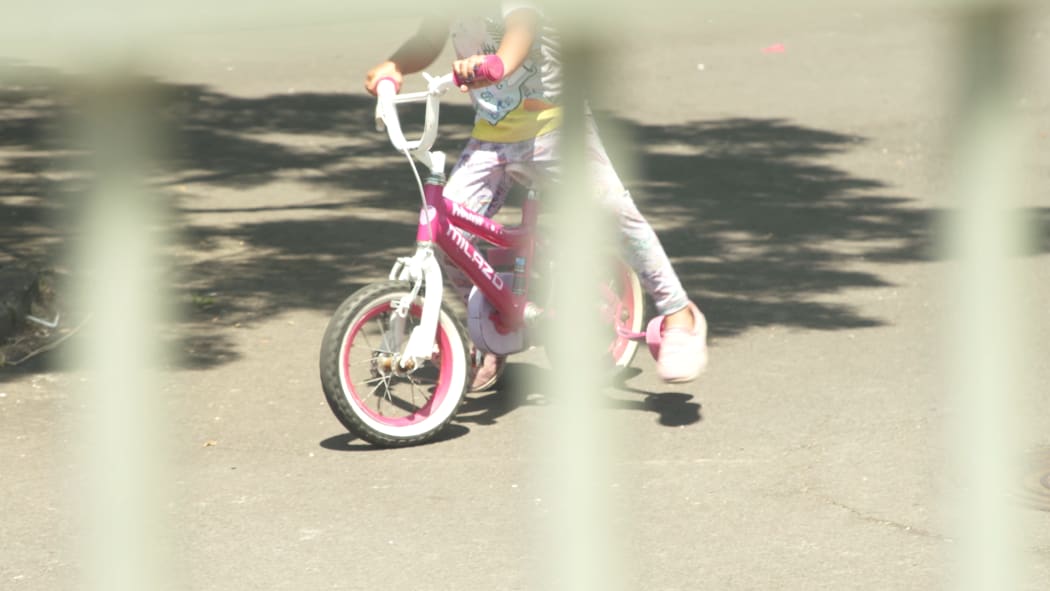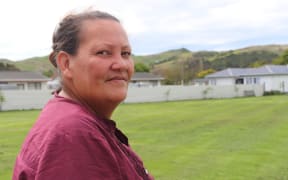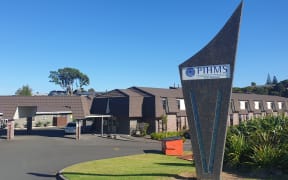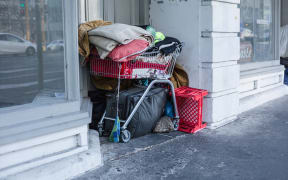Emergency housing has been described as dangerous and terrifying for some, with families mixed in with gang members and many places rife with crime and intimidation.

A child on a bike at an emergency accommodation motel. Photo: RNZ / Nick Monro
Official documents show ministers were warned about the "risks to public safety" in Rotorua a year ago, and that week-by-week motel accommodation is not so suitable for families, or those with high needs.
One Auckland charitable trust says some residents are especially vulnerable to sexual violence, which may only become apparent in years to come.
Causing further consternation is the Social Development Ministry's approach of leaving it up to the moteliers to make sure there's no violence, harassment or criminal behaviour, and only responding once an incident has occurred.
Using motels to get people off the streets and out of their cars was started by the previous National government; during last year's lockdown government agencies mobilised to get rough sleepers off the street but the demand for short term, urgent housing just keeps growing, with the government now spending $1 million a day on emergency and transitional housing.
Alarming stories continue to emerge about what life is like for many, with a major concern that families with children are being housed near drug dealers and sex offenders, with no support anywhere in sight.
An Auckland mum of four young children lived in emergency housing for eight months, but they've recently moved into a private rental.
As well as the room being cockroach-infested, she says in one place there were "alcoholics, drug addicts, gang affiliations, drug deals ... my kids witnessed a few domestic violence relationships that were two doors down from us - not a safe environment for kids".
She called police during one of the domestic violent incidents where "the lady was actually smashing up the motel room windows" but they only turned up two days later.
When she first moved in she "felt like a really useless mum", like she wasn't doing a great job, a mindset she's since had to turn around for the sake of her children.
Island Child Charitable Trust's chief executive in Auckland, Danielle Bergin, recalls visting a family in a motel in the middle of lockdown and seeing "a lovely child, six years of age, sitting in the tree and all she had was being able to look out at the cars all day".
"But as we drove into the motel up on the second story there were the dealers, and they knew everything that came in and out of that driveway ... incredibly high risk for the children on the premises."
In another case, a young woman found herself out of a job after having a baby, and was sent to a motel for emergency housing, Bergin says.
"She turned up with a very young baby on her on her hip, probably about five months old and the motelier looked at her and said 'are you fresh out of prison, because all my rooms have got prisoners'.
"Well, this young woman at the age of 20 was so frightened, she rang a friend who then said you've got to call Island Child Trust immediately, we were just lucky to be able to accommodate her and her child but it is quite frightening."
Bergin wonders if some families would actually be safer back in their cars, parked together as a community at a council reserve - "is that safer than actually being next to a room right next to sex offenders?".
She worries about what might come out in 20 or 30 years "because sexual abuse is not disclosed instantly, often, especially when it's children".
"So we have to hope that there's not going to be historic sex allegations come out when people reach their 25 and 30s from the motel."
This is a "very, very sensitive situation", says Bergin and is something that "needs to be talked about and it is something that needs to be changed for the safety of our children".
'Risk to public safety' in Rotorua
"It's slowly killing our town, I've never seen Rotorua so bad, so ugly, in all my life".
Official documents provided to National MP Nicola Willis show ministers were told last April the concentration of some "lower end emergency housing special needs grant motels and the night shelter in the CBD [were] creating risks to public safety" and "at the same time individuals are not getting the support the need".
The owner of Hennessy's Irish Bar in Rotorua, Reg Hennessey, says he's seeing "crime, drugs getting sold openly on the street, gangsters, youth gangs" and while he supports those in genuine need being housed, there are "some horrible, horrible things going on out there".
"When you walk past a motel on Fenton Street and you see Mongrel Mob colours hanging up in the windows, showing off so the whole world can see it, it doesn't make me proud to belong to Rotorua anymore."
With customers sitting in the bar's outside area he's seen people "walk along and reach over and grab a steak off someone's plate, I've seen them walk along, grab a person's packet of cigarettes or jump over the barriers and grab people's phones".
He described the situation for the children as "an unhealthy, absolutely disgustingly unhealthy environment".
"And for the council and the government to say, we're going to do something about it and not do something about it is just beyond ... these are just little kids."
Tiny Deane from Visions of a Helping Hand in Rotorua runs motels for those in need, many from gangs, with the aim of getting them into permanent housing.
He says active support to turn people's lives around, with social workers and security on-site, along with strict rules, makes a major difference.
"No drugs, no alcohol, no visitors" - hard and fast rules says Deane. "Any fighting, you're evicted, any drugs found, you're evicted, any alcohol found, you're evicted."
A few people have been shown the door, he says, but not "for ages ... because everyone knows our kaupapa".
Nine times out of ten Deane says the whānau in the motels "choose the right the right pathway".
"At the end of the day we say kids come first here, always."
Emergency versus transitional housing
Even before the pandemic the government was trying to shift more resources from emergency to transitional housing, including committing money for more places. The latter is cheaper, provides wrap-around support, and means the government can better monitor what's happening.
Ministers were told emergency housing means the government "cannot regulate for quality standards", it comes at a "higher cost per place which does not include support service costs" and "does not provide stablity".
A 2019 ministerial briefing also stated housing officials would be trying to get families with children into longer term housing as recognition "motel accommodation is more suitable for single clients or adults without children who do not have complex needs".
National's Nicola Willis says emergency housing was only ever supposed to be a short term solution.
If you put someone with high needs, with mental health needs or addiction and you "put them in a motel next to former criminals, gang members, and you say to them, 'good luck' and leave them there for months on end, you are not helping that family get proper housing", she says.
"That is not a solution for anyone. It is not treating people with dignity is not treating people with respect and it's not solving the problem."
Willis also asked a range of written parliamentary questions of Social Development Minister Carmel Sepuloni about how MSD monitors what's going in emergency motels.
Information about incidents of family harm, criminal activity or social disorder is "not centrally recorded", the minister replied.
Willis also asked how MSD monitors whether families are free from intimidation and harassment and that accommodation is safe and suitable - the response was emergency housing providers are expected to meet the relevant standards and when an incident occurs or "concerns are raised", MSD follows up with the provider on a "case-by-case basis".
Danielle Bergin says a much better system under which certain people are housed together, for example one motel for families only, one for single men and another for those who've just got out of prison.
Much better oversight is also needed, she says, like a specialist team who knows exactly where different people are staying, the details of their cases so they can then make decisions about the best place for them, and continue to monitor what's going on.
Wellington City Missioner Murray Edridge says there are greater volumes of people going into emergency housing, reflecting the housing shortage which is a "deeply complex and difficult issue to fix".
Inadequate support is creating problems when there are "people put together into groups ... who are struggling and in difficulty anyway".
"The reality is, people are in difficult situations," he says, "and without the ability for people to help them change their life course, their direction of travel, then things aren't going to get any better for them."
Housing Minister Megan Woods told Morning Report the situation is "not acceptable".
Woods says the government is aware of what is happening in emergency housing.
"This is the reality that we're facing."
She says she's asked central government agencies to convene in Rotorua and work with iwi and those on the ground to come up with better options.
"What we're looking at is moving away from having the two-track system."
The government is moving towards longer term contracting for Ministry of Social Development accommodation, she said.
"We expect that we'll be able to see some change in the coming weeks."
She says they're looking to provide more support to those in emergency housing.







